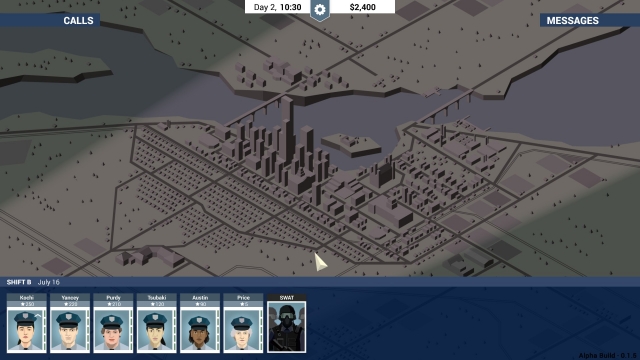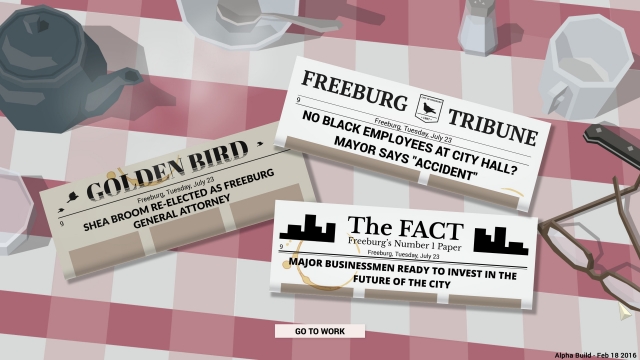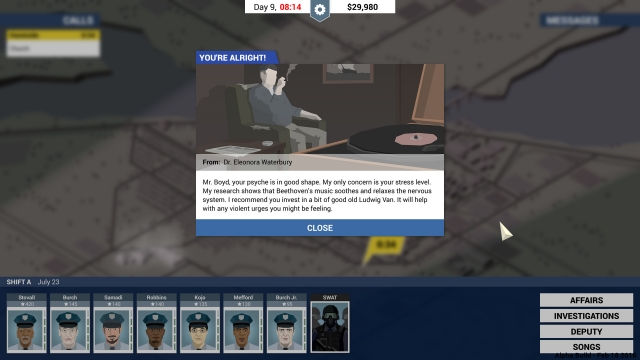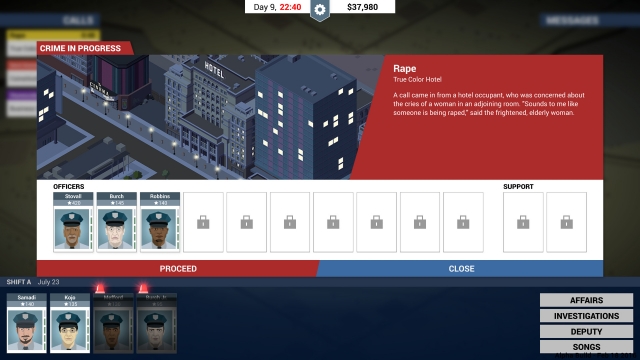
This is the Police Preview
Another criminal arrested, and my mind already rambles on the blissful utopia of a crime-free city. All my officers are well-trained and reliable, eager to continue our righteous crusade. Unexpectedly, a notification pops up: what had seemed like a petty theft is now a bloodbath, and three out of the four officers I sent now lie dead somewhere in an alley on the east side of town. Two of them women; a rarity in the force. As I try to scramble for a couple of able replacements from the labour market, I receive a message from the town hall: a feminist campaign has accused certain city divisions of sexism, and to prove them wrong, I am to equate the number of men and women under my command. Well I know that sex is irrelevant to my employees’ performance, but no woman wants to be a cop these days.
This is one of the many conundrums you will have to deal in This is the Police, a game that attempts to cast light on the hardships and dilemmas that the eponymous force encounter. You are Police Chief Jack Boyd, a sexagenarian cop who finds himself staring at the 180 last days of the long dark corridor that is his career. With the city plunging into chaos in every social, economic and political aspect, the careful threading of a balanced, just and cost-effective job is hard enough, so you will take no pleasure in having to deal with the tantrum requests by the aloof and haughty mayor, or by the capricious mafia capo. Staff management is the core pillar of the game. Deciding who to hire, who to send off to each call, or even which officer to have killed will make up most of your time in the game. You will train your officers, make sure they trust you, and you will appropriately yield before their lousy excuses about why they couldn’t come to work today.
 The game is designed as a roguelike, so after a couple of runs you’ll realise that ignoring the mafia or the town hall consistently is a Russian roulette. Ultimately, this is a game of ebb and flow, where both factions will be sending requests that may occupy your officers for a couple of hours, or perhaps even for the whole day — luckily, none of these assignments seem to pose any danger to them, as all of my hirelings were safe and sound after. Disappoint the mayor and you will be forced to cut back on the number of employees, which eventually may lead you to an understaffed force barely able to keep up with city calls and mafia requests. The incentive there may swiftly shift from money to survival, as armed men in suits don’t take kindly you letting them down.
The game is designed as a roguelike, so after a couple of runs you’ll realise that ignoring the mafia or the town hall consistently is a Russian roulette. Ultimately, this is a game of ebb and flow, where both factions will be sending requests that may occupy your officers for a couple of hours, or perhaps even for the whole day — luckily, none of these assignments seem to pose any danger to them, as all of my hirelings were safe and sound after. Disappoint the mayor and you will be forced to cut back on the number of employees, which eventually may lead you to an understaffed force barely able to keep up with city calls and mafia requests. The incentive there may swiftly shift from money to survival, as armed men in suits don’t take kindly you letting them down.
There’s slim joy in the few seconds of tension and grievance that follow the death of two of your best men. This is barely compensated by the mild satisfaction of having scored a perfect day — no casualties, all arrests. The reliability stat of each officer grows for every successful arrest, and proudly admiring your roster’s improvement at the end of the day, arms akimbo, is a deceitful feeling that can be turned to shreds on the first call of the next day. Juggling official and extra-official requests is challenging to one’s very firm moral scheme, but given that in this city, every inch of every bureaucrat is crooked to their bones, you end up finding peace with the idea of helping a Mafioso. After all, it’s all business: the collaboration is also providing you with a few off-the-books resources and good amount of extra income, very much needed to run the force effectively.
 At its current state, the game needs a bit of polishing in its balancing. In the example in the beginning, I wouldn’t be able to fire ten employees — all but two — just so I can have an equal amount of men and women. There is a similar request with blacks and Asians. Not only is it a nonsensical request — in three days, change 80 per cent of my staff —, but is also one where the cost of doing so excessively outweighs the rewards. It is rare, in fact, that you face a real dilemma. The lack of grounding in any of these requests — whether they’re sent by the mayor or the Mafia —, plus the disparity between the cost and the reward, make them impossible to be taken very seriously. This overrides any actual ethical conundrums you face and transforms the game into an outright system of business management. Any question about the day-to-day struggles that the force has to cope with is never touched upon, as the managerial aspect simply is a priority and what you have to play by.
At its current state, the game needs a bit of polishing in its balancing. In the example in the beginning, I wouldn’t be able to fire ten employees — all but two — just so I can have an equal amount of men and women. There is a similar request with blacks and Asians. Not only is it a nonsensical request — in three days, change 80 per cent of my staff —, but is also one where the cost of doing so excessively outweighs the rewards. It is rare, in fact, that you face a real dilemma. The lack of grounding in any of these requests — whether they’re sent by the mayor or the Mafia —, plus the disparity between the cost and the reward, make them impossible to be taken very seriously. This overrides any actual ethical conundrums you face and transforms the game into an outright system of business management. Any question about the day-to-day struggles that the force has to cope with is never touched upon, as the managerial aspect simply is a priority and what you have to play by.
As of now, there is a lack of options to play with when facing any particular turning point. Often, if you are requested three officers for the day, you can’t counter-offer with one due to the lack of staff, or promise that you will send them an hour later. These snotty man-babies want three now; otherwise they don’t want them at all! This is something that needs to be fixed, as it leads to some real frustration. Cases of corruption are another joke: it’s hard to believe that you’re that much on your own against any incrimination or threat. I get that the judicial system is not perfect, but the most unmasked and open corruption schemes are almost executed by filling a form — it’s just not believable enough, and turns complex moral questions into managerial debauchery.
 Aside from your roster of officers, you will also have a couple of detectives to handle each investigation that may arise. These are usually murders or thefts, and are solved by assigning one or more of your detectives to the case, who eventually will start coming up with possible situations for the crime, or ‘frames’. You will have to use your acute wit to figure out how the events transpired, with the only shortcoming that if you’re detectives are not reliable enough, they won’t discover any of these frames, and the case will be impossible to close triumphantly. Sadly, as it is designed right now, this leads to a vicious cycle: detectives don’t get more reliable, which means they never solve cases, and so on. If you happen to solve one, you can also track members of different gangs and have a psychopathic wall board with pictures, maps, and connecting red yarn.
Aside from your roster of officers, you will also have a couple of detectives to handle each investigation that may arise. These are usually murders or thefts, and are solved by assigning one or more of your detectives to the case, who eventually will start coming up with possible situations for the crime, or ‘frames’. You will have to use your acute wit to figure out how the events transpired, with the only shortcoming that if you’re detectives are not reliable enough, they won’t discover any of these frames, and the case will be impossible to close triumphantly. Sadly, as it is designed right now, this leads to a vicious cycle: detectives don’t get more reliable, which means they never solve cases, and so on. If you happen to solve one, you can also track members of different gangs and have a psychopathic wall board with pictures, maps, and connecting red yarn.
The low-poly visual design is detached and sober, which works perfectly when the story tries to be so pessimistic and introspective, shown in long comic-style cutscenes every few days. The accompanying music by Chopin, Liszt and Beethoven strengthens this idea, which rises and drops, giving an elegant and cathartic aura to each reluctant decision you make. What’s more, the practice of putting a record on at the start of each day becomes almost ritualistic, and somewhat entrancing.
 While this game looks great, in the build we played the coveted insightful commentary is masked by a structure that is too hermetically procedural, where there’s little space for the people-driven nuances that create meaningful moral dilemmas, which is probably closer to the experience of being a cop. Personally, I can’t wait to see how the developers add the finishing touches and turn it into an excellent message with the clever agenda that this original and good-looking game deserves.
While this game looks great, in the build we played the coveted insightful commentary is masked by a structure that is too hermetically procedural, where there’s little space for the people-driven nuances that create meaningful moral dilemmas, which is probably closer to the experience of being a cop. Personally, I can’t wait to see how the developers add the finishing touches and turn it into an excellent message with the clever agenda that this original and good-looking game deserves.











COMMENTS
Acelister - 05:02pm, 18th May 2016
I'm interested in how this is going to be improved upon.